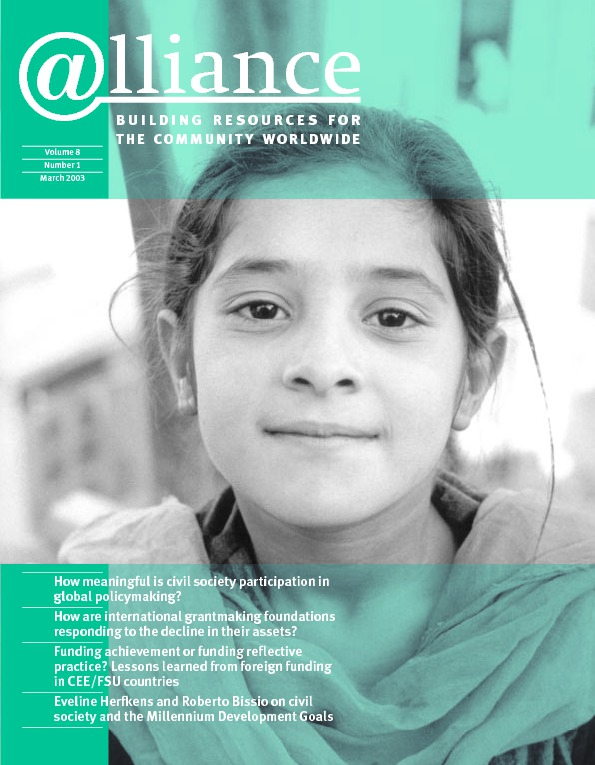The government of Hungary is proposing to set up a National Civil Fund that will finance NGOs’ core operational costs – and they would like a legitimate representative of Hungarian civil society to be available to sign a contract on behalf of the sector. Should NGOs set up an umbrella body to perform this role, or would this be just another example of a dependent civil society dancing to the government’s tune?
It all started with the elections in June 2002, when a thus far undiscovered part of Hungarian civil society emerged in vociferous support of the former conservative governing party. When the socialist party won the elections with a very small margin, they were quick to reassert their linkages with ‘civil society’ and the ‘masses’. In the past six months, the government has worked out a new Strategy Towards Civil Society,[1] a sensible and comprehensive document on the development needs of the third sector in Hungary.
They have also come forward with a proposal for a National Civil Fund to finance, among other things, the core operational costs of NGOs. The plan is to finance it from the 1 per cent tax designations that Hungarian taxpayers do not choose to dedicate to an NGO. Since only about 40 per cent of taxpayers designate their 1 per cent tax, the remaining amount is quite significant ($26 million in 2002).
Initially, the government said the Fund could be set up only if a ‘partner’, a legitimate body representing civil society, was available to sign a contract with them and safeguard the distribution of financial assets, but they have since modified this position.[2]
An umbrella body for the sector?
For the past six months, NGOs in Hungary have been discussing the issue. Monthly open fora have been held and working groups set up. It seems that there is much to be worked through before the sector can produce a truly legitimate umbrella body. The first question is whether such a body is needed at all.
According to the critics, civil society does not gain its legitimacy from representation (unlike the political sphere) but from its results. A diverse civil society cannot be unified under one umbrella. According to the sceptics, too much taxpayers’ money is already being spent on supporting NGOs[3] without any relevant feedback about its impact. Introducing another major central funding source seems to have more to do with political vote-winning than civil society development.
Nevertheless, most NGOs and experts, including many sceptics and critics, are advocating that NGOs should do their best to cooperate with the government. Many feel that the time has come for a real partnership between the two sectors. Others see it as a great opportunity to improve communication and cooperation within the sector, regardless of whether or not a representative body emerges.
The commonly accepted assumption upon which both government and NGO efforts are based is the interdependence of the two sectors – and this might be where the main problem lies. Can the de facto dependence of NGOs really be turned into interdependence in the space of a few months? Some see the very fact that NGOs are mobilizing to organize self-representation because the government is asking it of them as the most telling symptom of the deep-rooted dependence of Hungarian NGOs. By requiring a single NGO representative body whose delegates are majority members of the decision-making council of the new Fund, the government is buying out the sector in the good old manner of socialist corporatism.
The power relationship between government and NGOs is not likely to change without a change in the current paradigm about how civil society should operate. This assumes that state support is always welcome and never enough; that because NGOs are doing public good, they are entitled to state support; that the beneficiaries should be represented on the decision-making body of a public fund; that the more representative something is, the more legitimate it is; and that civil society needs to be represented in the political decision-making process.
The first thing that’s needed is a clear distinction between taxpayer-financed and elected political governmental structures and voluntarily organized non-profit organizations. NGOs should be seen as the vehicles of participatory, not representative democracy. State financing of NGOs – whether through grants or contracts – should be seen as a variation of procurement that requires strict anti-corruption rules and high accountability standards.
As long as both parties are still thinking within the old framework, there is little chance that civil society in Hungary will organize itself not in support of political parties but in support of social causes.
- Available in English on http://www.nonprofit.hu.
- The original draft law for the Fund, published in December, specified that eight members of the 13-member council would be delegated by an NGO national representative body. Accepting that this is practically unimplementable, it has now been agreed that until such a body can be set up, or it is possible to nominate these NGO delegates, the government will itself pick the NGO representatives on the council. That makes the law more implementable but no less problematic.
- US$660 million in 2001 through various budget channels.
Nilda Bullain is Senior Legal Adviser with the International Center for Not-for-Profit Law in Budapest and Chair of the Civil Society Development Foundation, Hungary. She can be contacted at Nilda@icnl.org.hu






Comments (0)